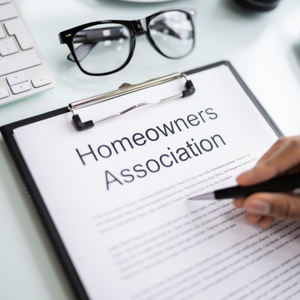
Closing costs in Georgia are intricate, as is determining if the HOA fees are to be paid. These costs impact buyers and sellers, as unexpected fees may arise at the closing table. This guide from Yellow Card Properties will simplify the details and responsibilities of HOA fees at closing. We will address some of the closing costs and provide as much insight as possible to help with them.
Understanding Closing Costs in Georgia
In Georgia, Closing Costs include all expenses related to the sale of a home, which come from various sources and can consist of attorney’s fees, closing agent’s fees, and homeowner’s Association Fees. Both sellers and buyers, of course, need to have an understanding of the various costs involved to prevent unpleasant surprises from occurring. In Georgia, these expenses are generally related to the closing attorney’s fees, costs for title examinations, and various fees for assessments. A better understanding of these fees can ensure a more seamless transfer and help all parties involved comprehend the expenses associated with selling a home.
What Every Home Seller Needs to Know

As a Georgia home seller, it is crucial to recognize how closing costs impact your transaction. Certain fees are split, while others fall entirely to the seller, including portions of the property taxes, outstanding assessments, and some expenses related to the title. Gaining an Understanding of these expenses with your closing attorney is crucial to determining the liability these costs create, as well as to reveal whether items such as HOA fees can be negotiated as part of the sale.
Additionally, Sellers need to clear any liens or assessments prior to closing, including dues to the HOA and any special fees to a community that are charged up to the closing date. To avoid hold-ups, it is best to familiarize yourself with your HOA’s policies early on so that the ownership transfer can be done seamlessly. Sellers can negotiate under these precise conditions without the risk of an unexpected issue, creating a more balanced transaction. All of which lays the groundwork to make the entire process efficient and as smooth as possible for both parties.
Standard Fees Involved in the Process
When it comes to the costs associated with closing on a home in the state of Georgia, both buyers and sellers must budget for the closing attorney’s fee, title insurance, and title insurance-related fees, as well as other closing costs. The title insurance fees are necessary to ensure that both parties are protected, and a title search will be conducted to verify that there are no liens against the property. If there is a Home Owners Association (HOA), the seller will need to be aware of any transfer fees the HOA may charge when ownership is transferred.
Since some fees can be negotiated, buyers and sellers will be able to split the costs of home warranties and certain transfer taxes. Financial strain is alleviated, and improved communication can be achieved to foster a better working relationship, leading to a smoother closing process. The bulk of these fees is known and anticipated, which enables sellers to budget more effectively and makes for a more seamless and efficient closing process.
The Role of the Homeowners Association in Closing in Georgia
In the state of Georgia, homeowner’s associations are vital to the closing of the sale of a property. The HOAs charge HOA fees, which are used to upkeep the community amenities and services. It is beneficial to sellers and buyers to understand who pays these fees at closing to avoid potential fees. In addition, to avoid issues at a closing, unassessed fees must be paid. By comprehending the responsibilities associated with HOA fees, the parties to the transaction can better understand the economics of the closing, especially for those exploring options like cash home buyers in Richmond Hill or in nearby cities.
Who Pays the HOA Fees?
Understanding Georgia Law Realty, a question that arises in every home sale transaction in Georgia is: Who pays the HOA fees at closing? These HOA fees are used for the maintenance of the neighborhood and its facilities. The seller is typically responsible for paying these fees until the closing date, ensuring that no unpaid fees are transferred to the buyer. This responsibility can be negotiated, and the buyer may agree to take on some fees in exchange for Other Concessions, such as a lower sale price or agreed-upon repairs. This issue is particularly prone to misunderstanding and is therefore brought up to ensure that the parties understand the implications of this issue on their finances.
To avoid misunderstandings, the parties to the transaction are usually the title company and closing attorney, who are the professional parties, and they will take the time to analyze and confirm how HOA fees will be charged in the transaction. Buyers should, at the outset of the transaction, inquire about the amount of the HOA fees so that they can prepare their budget for the transaction, and they will not be surprised by the fees after they have moved into their new home. Knowing how these fees work in a transaction and who is obligated to pay the fees will contribute to a smoother closing process and provide the new homeowners with an opportunity to engage with the new community with a feeling of security and knowledge.
Settling Unpaid Assessments
Outstanding HOA dues by previous owners, and unpaid assessments, may complicate a Georgia real estate closing if they are not addressed beforehand – they are a potential liability for both buyer and seller. In order to alleviate potential holdups and disagreements, sellers should clear and pay all dues a good time prior to closing because organizations such as the West End Community Association may require all of their fees to be fully paid and all payments to be set up in an order such that payments are made at closing. Settling these with the HOA early in the process allows for an obstacle-free transfer of ownership and protects the buyer from inheriting additional, and likely unanticipated, costs.
Having a competent closing attorney allows both parties to comprehend and deal with any outstanding HOA fees, detailing seller obligations and avoiding closing confusion. Subsequent buyers must also examine the property’s HOA obligations and ascertain with the seller/owner whether any outstanding dues exist. This arrangement clarifies responsibility and enables a seamless transaction with minimal complications. Based upon the information presented, the following outlines a reasonable course of action to assist all parties in facilitating a more seamless and uncomplicated outcome.
- Stay Updated: To gain a better understanding of outstanding balances, be sure to request the latest assessment history.
- Establish Open Dialogue: To get a head start on matters involving unpaid assessments, maintain direct communication with the relevant individuals.
- Arrange for Compromise: To determine a path to paying overdue amounts, discuss with the concerned parties the possibility of payment arrangements or other compromises.
- Obtain Expert Opinion: To clarify complex assessments and identify better alternatives, consult with qualified professionals.
- Confirm Your Duties: To avoid misunderstandings, ensure that all assessment obligations are clearly understood and accepted prior to completing the transaction.
- Keep Everything: Maintain a complete record of all communication regarding unpaid assessments for your protection.
- Assess Consequences: Consider the potential impact that unpaid assessments may have on the property’s value or the outcome of negotiations.
To ensure that real estate deals progress efficiently and safeguard the interests of all parties involved, thorough preparation is necessary beforehand.
Transfer Fees and Their Impact
Closing costs are always pivotal to real estate transactions in the state of Georgia, particularly in the aspect of buying and selling real estate. Ownership transfers are required, and closing costs impact the net to both the seller and the buyer. Closing costs are a financial element that can be transferred to the buyer and seller during a negotiation. In real estate, the buyer and seller plan, and closing costs impact how they do that planning. Evaluating the closing costs for both buyer and seller can lead to real estate sales that occur more easily and are more successful. Let us examine how closing costs impact real estate negotiations.
| Aspect | Buyer Considerations | Seller Considerations | Community Impact |
|---|---|---|---|
| Cost Allocation | Buyers may need to budget for additional expenses due to transfer fees, affecting overall affordability. | Sellers often negotiate who covers the transfer fees, potentially affecting net proceeds. | Revenue from transfer fees can be allocated to local projects, benefiting community development. |
| Legal Obligations | Understanding legal obligations regarding transfer fees is crucial to avoid unexpected liabilities. | Sellers need to be aware of any legal responsibilities to ensure compliance and smooth transactions. | A clear legal framework contributes to the transparency and fairness of property transactions in the community. |
| Negotiation Leverage | Transfers fees can be a point of negotiation, allowing buyers to potentially reduce upfront costs. | Strategically offering to pay transfer fees can make a seller’s offer more competitive to potential buyers. | Negotiation outcomes influence market dynamics, affecting property values and accessibility. |
| Market Variability | Buyers must consider how differing transfer fees across regions impact overall purchase decisions. | Sellers should be aware of regional differences as they prepare properties for market to set competitive prices. | Variable transfer fees can reflect economic conditions and influence local property market stability. |
This table summarizes the nuanced roles and considerations of transfer fees in Georgia’s property transactions, highlighting critical financial and communal implications.
How Transfer Fees are Handled at Closing in Georgia

In Georgia real estate closings, transfer fees are a standard practice due to the administrative handling of ownership transfers, which is usually performed by the HOA. These are the lower fees for updating HOA records. Transfer fees are calculated based on the value of the real estate, HOA bylaws, and community arrangements. Transfer fees are separate from title insurance, survey fees, and other related costs. To avoid confusion, these fees should be included in the buyers’ and sellers’ closing budgets.
In Georgia, the party responsible for paying transfer fees is typically specified in the sales contract, as the fees can be assigned to either party or negotiated as part of the offer. If you’re looking for a company that buys homes in Savannah or in nearby cities, this flexibility can be especially beneficial, as many cash buyers are willing to cover certain fees to streamline the transaction. Having good communication regarding one’s expectations is important here because of the values and the bargaining power of both sides that determine who pays. This coordination downstream is made seamless with the assistance of a qualified closing attorney, who ensures that the fees are duly recorded and there’s consensus over them, thereby avoiding disputes and providing a smoother and clearer closing for all parties.
Impact on Georgia Buyers and Sellers
Considering that the previous Georgia owner has ultimate authority over the remaining property Dues in the closing process, the responsibility for removing all closing property dues over which the seller has control remains with the seller closing. This includes all unpaid dues, such as HOA dues, and all assessments and charges associated with the closing owner’s date of ownership. Closing sellers alleviate the burden of title problems and other legal problems (that the buyer will inherit along with the house) by paying the closing dues in full as of the closing date. The seller also pays any transfer fees, unless a different agreement has been made, so the seller always has to account for transfer fees.
Because of the previous owner’s responsibilities, the seller will need to work with a Georgia closing attorney. Such closing services will provide Georgia closings and the owner with all of the attorney services and closing costs. Attentively and efficiently paying dues supports closing sellers’ efforts in achieving a successful sale and closing.
Identifying Who Pays What at Closing in Georgia
When it comes to Georgia real estate closing costs, they will always be expensive for both buyers and sellers. However, both parties will typically understand who is responsible for what in terms of closing costs, such as HOA fees and title-related fees. Sellers will often pay for unpaid assessments or some title fees; however, through negotiations, some title expenses may be split between the parties, and the sale price may be adjusted accordingly. Sellers and buyers will always be able to understand how the costs will impact thinking and the transfer of property. Understanding who incurs the costs helps the buyers and sellers understand what to anticipate and helps the closing to be as uncomplicated as possible.
Responsibilities of the Previous Owner
Former owners in Georgia have particular duties at closing, and determining if there are any property-related debts the former owners need to pay off before the closing of the sale. These are generally unpaid HOA dues, assessments, and any other fees tied to their time of ownership. By paying off these debts to the closing date, the former owner helps to ensure a clear title and avoids any legal and financial headaches down the road for the buyer to resolve. These debts almost always include transfer fees, which, unless the parties agree to different terms, usually fall on the seller, making it necessary for the seller to consider their responsibilities on all debts in advance of closing.
To avoid complications in the final transaction, the seller should communicate these responsibilities to a closing attorney. Working with the closing attorney makes it possible to settle all the matters regarding the fees and the closing documents in accordance with the state of Georgia closing instructions. By paying off balances and dealing with any of the items that can be negotiated, the Seller will minimize the chances of any obstacles or issues coming up in the transaction, resulting in a quicker and problem-free closing of the home.
Clarifying Who Pays and Who is Paid in Georgia

Having an insight into who pays what in the closing processes will allow you to avoid losing money in closing expenses when buying or selling a property in Georgia. Georgia sellers pay closing expenses that are directly related to the seller’s period of ownership, such as HOA fees, as the sellers have to waive those fees in order to convey the property free and clear. As with many other closing costs, there are conditions with this one that may be adjusted. In certain circumstances, sellers will retain other closing costs, but will agree to pay this one in order to receive the closing cost concessions, or in order to obtain the real estate in a distressed, as-is condition. This foreshadows the flexibility in Georgia real estate transactions.
Estimating and allocating closing expenses is not only the responsibility of the closing attorneys and title companies; for that reason, many sellers and buyers in Georgia real estate transactions use closing attorneys and title companies to determine the closing expenses for each party. Again, in maintaining a legally binding closing transaction, these professionals will address the proper closing expenses of each party and balance all fees against the expenses in a legally compliant manner. Again, for the sake of closing negotiations to simplify closing expenses, Georgia sellers sometimes end up paying to remove the closure of a price on closing assessments or transfer fees.
Knowing who pays HOA fees at closing in Georgia is essential to facilitate the smooth completion of your home sale. Sellers can mitigate extra expenses and delays in the closing process by identifying these fees early. A knowledgeable closing attorney and/or real estate professional can assist sellers with details of every closing cost. Knowing what to expect can ease the process for both parties. Consider our guide to calculating closing costs in Georgia to help you sell your home.
FAQs
Who is typically responsible for paying HOA fees at closing in Georgia?
Generally speaking, HOA Fees in Georgia are usually paid by the seller, who pays the fees up to the closing date, so the new owner has no dues. Nevertheless, HOA Fees can be allocated differently and can be tailored as a term of the sale contract.
What are the typical closing costs for sellers in Georgia?
Sellers generally must pay some property taxes, unpaid assessments, title insurance, and HOA Fees. Being aware of these obligations is essential to avoid surprises on closing day.
Are there negotiable fees in the closing process?
Indeed, transferring ownership taxes and fees for home warranty plans can be negotiated. Discussing the division of costs with the buyer can ease the financial strain for both parties during the closing period.
What role do transfer fees play in Georgia property sales?
The administrative costs spectrum when changing ownership of a property includes transfer fees. These costs may be divided between seller and buyer depending on the agreement. A clear understanding and negotiation of these fees is vital for a smooth transaction.
Why is it essential to review HOA policies before selling a home?
Our examination of HOA policies clarifies the specific financial responsibilities of sellers regarding unpaid assessments prior to closing. Effective oversight of these assessments minimizes the possibility of delays and facilitates seamless transitions of ownership.
Do you need to sell your home? Wondering who pays the HOA fees at closing? Yellow Card Properties is here to help. We handle all the details, including clarifying HOA fee responsibilities, offer fair cash deals, and make the process seamless, with no costly repairs or stress involved. Ready to sell or have questions? Contact us at (904) 539-4420 for a no-obligation offer. Get started today!
Helpful Georgia Blog Articles

